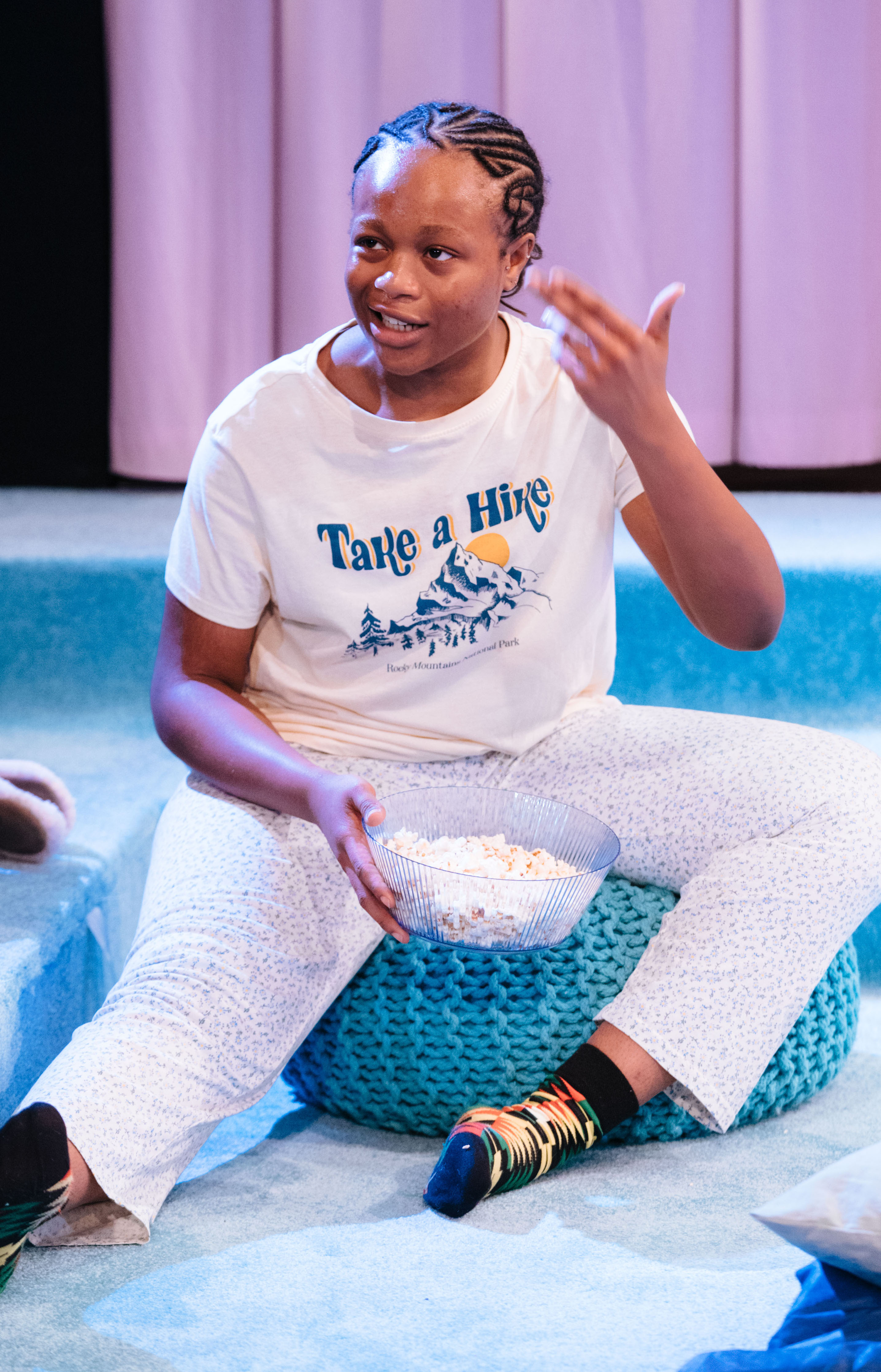Can a play ever be a bit too much like real life? The thought came to me while watching Matilda Feyisayo Ibini’s entertaining new play Sleepova at the Bush. This latest opening is almost a bookend to the excellent Red Pitch, premiered at the same address last year: another intimate piece about teens in transition to adulthood, but this time featuring a sparky female quartet, not a football-mad trio of young men. It has more lightness of spirit, but less grit.
Proceedings start before lights down, with the voices of girls chatting behind the scenes and singing along to tracks playing over the sound system. They go on to announce the particular ethnicity of the characters now lying onstage (mixes of African, Caribbean and Caucasian) and their eye colour. We are placed in the middle of their private lives, eavesdropping on secrets. This is also a “relaxed” production that encourages audiences not to sit clammed up but to express their feelings and pop out briefly if needed, which adds to the party atmosphere.
The set by Cara Evans resembles a Roman conversation room, stepped down to a central performing area, all carpeted in a modish pale green; there are lockers for props around the sides to which the girls consign their stuffed animals and posters, emblems of the young selves they are now trying to shed. Curtains at the back lead to the world of grown-ups. The set will mutate into the way-stations of the girls’ teenage lives – more friends’ bedrooms, the school prom, a hospital ward – as we follow them over the 18 months before they are due to leave school.

The opening scene is set in the bedroom of Shan (Aliyah Odoffin), whose parents have allowed her to host her first sleepover with her three besties to celebrate her 16th birthday. Shan is a nervous host, spraying the room, and herself, with perfume before the others arrive: Rey (Amber Grappy), studiously bohemian and queer, with well-off parents, radical views and an odd penchant for New Age crystals; Elle (Shayde Sinclair), an earnest Christian with a bible quotation for all occasions and an unresolved tension about her sexuality; and Funmi (Bukky Bakray), a droll, smart go-getter with an insatiable interest in boys, who lards the dialogue with the Yoruba phrases she has picked up at home.
Over the next two hours the girls will chew over the topics closest to their hearts – boyfriends, makeup, parental problems, what’s on their “socials”, why black girls can’t be brunettes – but also weightier issues such as what is, and isn’t, “African”, or which religion to follow, if any. Funmi is so keen to find a boyfriend at the prom that she is planning to use Yoruba incantations from a book she has “borrowed” from the library, possibly deploying animal blood from the butcher’s for this ritual too.
As Funmi, Bakray (pictured above right) is the same compelling presence she proved to be in her breakout role in the film Rocks. She is the natural comedian of the four, imitating her Nigerian parents in basso tones, but also the most clear-sighted, unaffected by the kinds of agendas that beset Rey and Elle, or by physical constraints, as is true of Shan. She is definitely an old soul: what the girls would call “her own person", which the others are still striving to be. Shan might seem the tragic one, an artistic girl undergoing regular “crises” caused by her sickle cell anaemia that upend her schooling and her love life. But it’s Funmi who is the best written and most complex, chinks in her armour hinting at a sadder core. You sense she is too intelligent to believe all her plans will work out, but she will attempt them even so.
The writing is intermittently witty and acute, though the girls’ stories run on familiar rites-of-passage tracks (problems with exams, strict parents, betraying boyfriends and the like). Other issues are referred to – such as mixed-race Rey’s antipathy towards her white stepmother, and her co-option into the “Fempire” of a mysterious Black “mentor” called Azure; Elle encounters Christian organisations that are supposed to reprogram her sexually – but they aren’t significantly fleshed out. The text rattles past, sometimes at breakneck speed, with all four talking over each other. Director Jade Lewis keeps it all lively and real, but the authentic messiness isn’t always an aid to comprehension.
There is a winning sweetness, however, to the relationships between the four girls, as well as a welcome sourness that surfaces when they are under duress. This recipe could do with more flavours, to give it more dramatic focus, but the cast are huge fun to hang out with. The prom scene, where they parodically pose for each other’s smartphone cameras in their finery, is especially entertaining, as is the sexy catching-a-wine dance routine Funmi and Shan perform (with pillows). The result is the best theatrical party in town.














Add comment